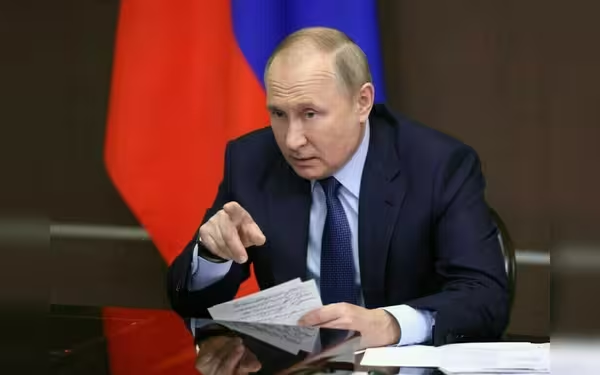Saturday, November 16, 2024 05:58 PM
Ukraine Gas Deal Termination Impacts Europe More Than Russia
- Ukraine ends gas transit deal with Russia.
- Putin claims Europe will suffer more from the decision.
- Gazprom faces financial challenges amid reduced gas exports.
 Image Credits: brecorder
Image Credits: brecorderUkraine's termination of the gas transit deal with Russia poses significant challenges for European energy security, according to Putin.
MOSCOW: The ongoing conflict between Russia and Ukraine has led to significant changes in the energy landscape of Europe. Recently, Ukraine announced its decision to terminate an agreement that allowed Russia to transport gas through its territory. This agreement, which was established in 2019, has been beneficial for both Ukraine and Russia, generating substantial revenue for both nations. However, Ukrainian President Volodymyr Zelensky has made it clear that the deal will not be renewed when it expires at the end of this year.
During a recent question and answer session at Russia’s Eastern Economic Forum in Vladivostok, Russian President Vladimir Putin stated, “Ukraine is refusing our transit, which means that the volumes of gas coming to Europe will be reduced.” He emphasized that this decision would have more severe consequences for Europe than for Russia. Putin acknowledged that while Russia would experience a reduction in income, it would not be detrimental, as Gazprom, the Russian energy giant, would focus on supplying gas domestically.
Since the onset of the conflict in Ukraine in 2022, Europe’s gas imports from Russia have plummeted by over 90 percent. This drastic decline has compelled Russia to seek alternative markets, particularly in Asia, with China emerging as a key buyer. The ongoing conflict has also rendered many transit routes for Russian gas exports to Europe unusable, including the Nord Stream pipelines, which were destroyed in September 2022.
Currently, Russia can still transport gas through the Sudzha entry point, although Ukraine recently claimed to have captured this route during its cross-border offensive. However, this option will also cease to exist once the 2019 agreement comes to an end. Gazprom, which previously generated significant revenue for the Russian government, is now facing financial challenges due to the European Union's reduction in gas purchases.
Experts from the Russian business daily Vedomosti estimate that the loss of Ukrainian transit routes could cost Gazprom an additional $5.5 billion annually, which represents about six percent of its total revenue. On the other hand, Ukraine currently earns around $800 million in transit fees from this agreement, which constitutes approximately 0.5 percent of its GDP. However, this figure does not account for the operational costs associated with maintaining the gas transit system.
The termination of the gas transit agreement between Ukraine and Russia is poised to reshape the energy dynamics in Europe. While Russia may find ways to adapt by focusing on domestic supply, the implications for European energy security are significant. As the situation evolves, it will be crucial for European nations to explore alternative energy sources and strategies to mitigate the impact of reduced gas supplies from Russia. The ongoing developments in this area will undoubtedly be closely monitored by energy experts and policymakers alike.













